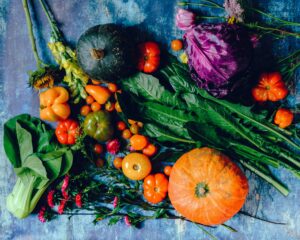As we head into summer, it’s a fantastic time of year to feast on the wonderful world of summer fruits and vegetables. Nothing says summer in Australia more than a slice watermelon, piece of mango or the sweet and sour taste of the Aussie pineapple!
Fresh is always best and eating in season means fresher, more cost effective and nutrient dense produce. However, once you get the fruit and veg home how do you keep them from going rotten. (It’s estimated each year Australians waste a full shopping bag full each week, costing them over $2000 each year! And not to mention the impact on the environment.)
So, how do you keep your fruit and vegetables fresh and minimize mold and unwanted smells. I’m sure we have all been there- avoiding the tedious task of cleaning out the fridge in fear of what you might find growing on the back shelf!
Follow these 5 simple tips on how to organise your fridge so it’s cleaner and easier to navigate, all while making the most of your fruit and vegetables so they don’t go to waste.
- Keep the Fridge Clean
When was the last time you really cleaned your fridge? Think about doing a deep clean. You can reduce leaks in your fridge by storing any packages with liquid in a container. Open packages, like wrapped meats, often leak and can cross-contaminate other items in your fridge like your fruit and vegetables.
Tip: Did you know baking soda can be used for more than baking?! Store an opened box of baking soda (replacing every 3 months) in your fridge to help eliminate any nasty smells (good for when you are away on holidays).
- Lower vs. Upper Shelves
While you may think a shelf is a shelf, where you store your produce is super important for long-lasting, fresh-tasting veggies. Keep these in the lower crisper drawers and set at a lower temperature.
- No two fruits and veggies are the same: so, don’t store them the same!
The number one rule of storing fruits and veggies is to be sure you aren’t storing them together. Each type needs a specific environment to stay fresh. Fruit thrives from low humidity, while vegetables prefer high humidity. Fruits (and some veggies) are also known to produce ethylene, a chemical which helps them ripen — and can cause your neighboring vegetables to ripen sooner than you’d like. Common refrigerator items are:
Berries: keep dry (and don’t wash until you eat them). Avoiding moisture keeps away mold growth.
Fresh herbs: wrap in a damp paper towel and pop them in glass of water or loosely wrap them in plastic. By reducing oxygen flow, you’ll be able to maintain its nutritional value.
Citrus fruits: store these in a mesh bag. The oxygen circulation allows citrus to last longer.
Celery: wrap in tin foil so your stalks stay crunchy for 1-2 weeks.
Asparagus: keep upright in a glass of water. This keeps the bunch fresh and hydrated for 1-2 weeks.
Mushrooms: store together in a paper bag. Brown paper absorbs excess moisture allowing mushrooms to breathe.
Carrots: cut off the leafy green tops. The tops will continue sucking the nutrients out of the carrots as you store them. By doing this, your carrots can last up to 2 weeks.
Cucumbers: thoroughly dry and wrap in paper towel, then place in the crisper drawer for maximum freshness. Cucumbers will last between 5 days and 1 week in the fridge as long as excess water and humidity is kept to a minimum.
Dark leafy greens: (Spinach, kale, lettuce) Its about reducing excess moisture. Wrap them in paper towels and put in a glass container, silicone pouch or plastic containers with tight fitting lids. They should stay nice and crisp for at least 1 week.
Tip: Bring fruit and vegetables to room temperature before eating, this gives it the best flavour.
- Reviving your dying veg
If your vegetables are looking like a bit sad and saggy, cut of the end and leave them a bowl of cold water for 24hours in the fridge. Its amazing to see some of the vegetables like carrots, celery, silver beet come back to life with some crunch left. If they are beyond saving, you can always use them to make stock or vegetable soup- something you can store in the freezer for a few months.
- Not all veggies need refrigeration
There are many food items that keep and actually taste better when they are left on the countertop. Gain some extra space in your fridge by leaving these items on the counter:
- Tomatoes
- Onions
- Garlic
- Basil
- Pineapple
- Apples
- Peaches
- Nectarines
- Pears
Author: Michelle Barnes – clinical nutritionist and wellness coach
